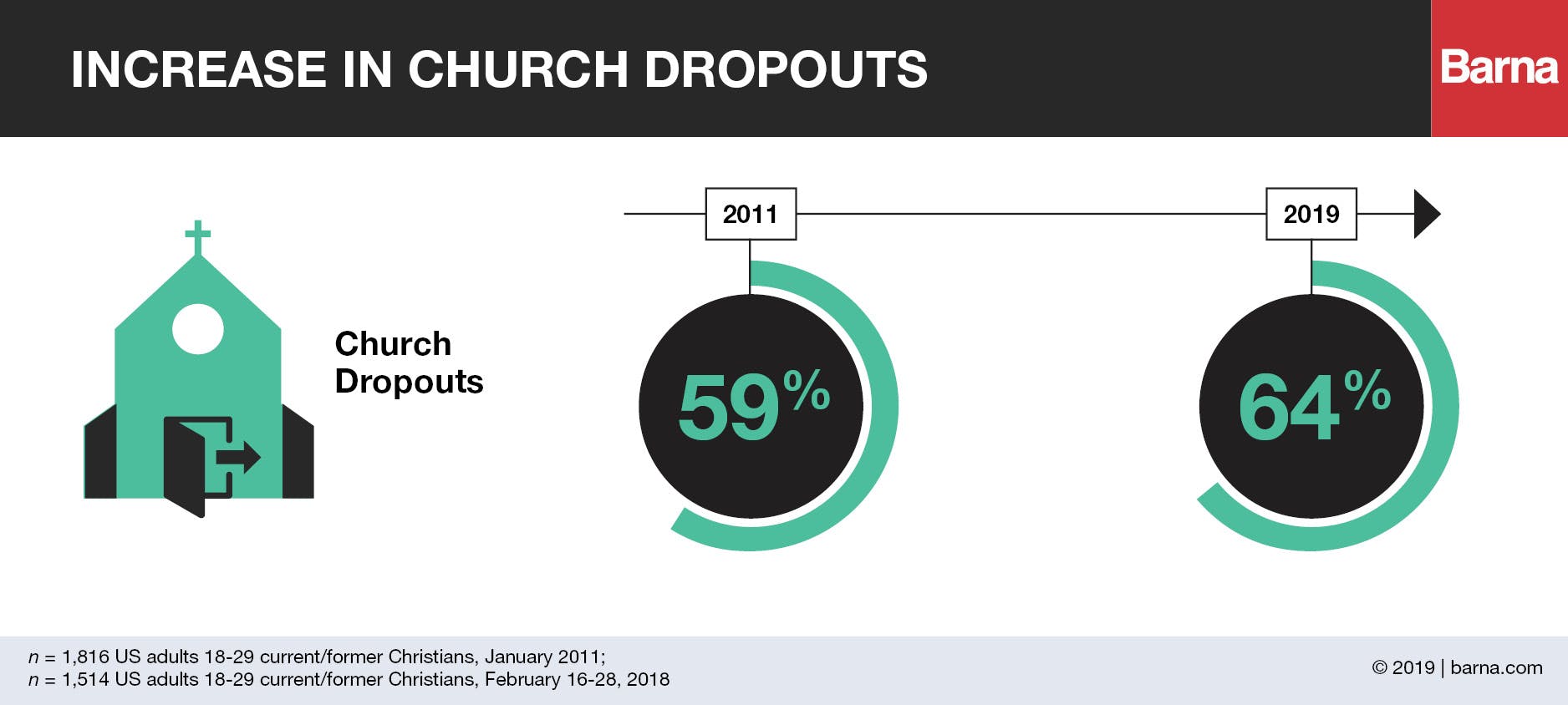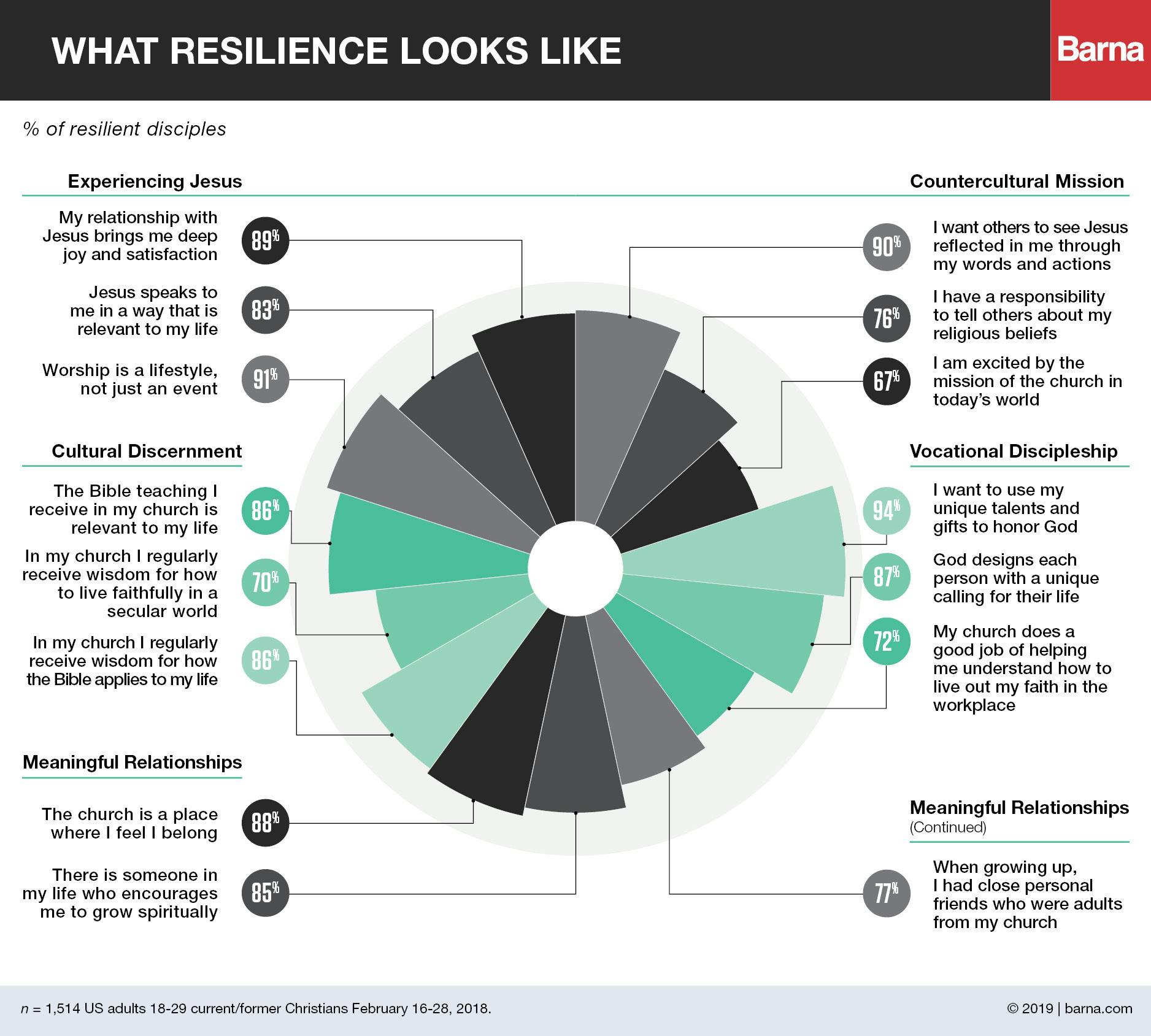Stopped Going to Church at Young Age but Want to Go Again Now
When Barna president David Kinnaman published his 2011 book Yous Lost Me, nosotros heard from many people (especially church leaders) who were shocked to larn that 59 per centum of young adults with a Christian background had dropped out of church at some point during their 20s—many for just a fourth dimension, but some for good.
Eight years later, research for Kinnaman's new book Organized religion for Exiles: 5 Ways for a New Generation to Follow Jesus in Digital Babylon reveals that the church dropout trouble is still a problem. In fact, the pct of young-adult dropouts has increased from 59 to 64 per centum. Nearly ii-thirds of U.S. 18–29-year-olds who grew up in church tell Barna they take withdrawn from church involvement as an adult after having been agile every bit a child or teen.

It is non all bad news, notwithstanding. Through more than a decade of interviewing teens and young adults, Barna researchers kept encountering a small-scale merely significant number of immature Christians who run counter to the overall trend. So, using the same research parameters as in You lot Lost Me (18–29-year-olds with a Christian background), Kinnaman and the Barna team fielded new research to report the countertrend. Aye, virtually Christian twentysomethings spend at least some time disconnected from a faith community. Merely what about those who stay? What, if anything, exercise they have in common?
In Faith for Exiles, Kinnaman and his coauthor, Mark Matlock, get to know the one in x young Christians for whom they've coined the term "resilient disciples." "From a numbers point of view," Kinnaman says, "10 percent of immature Christians amounts to just under four million 18–29-yr-olds in the U.South. who follow Jesus and are resiliently true-blue. In spite of the tensions they feel betwixt church building and everyday life, they proceed showing up."
Then what does it hateful to be a resilient disciple? Equally defined in Faith for Exiles, individuals in this group: have made a commitment to Jesus, who they believe was crucified and raised to conquer sin and decease; are involved in a faith community across attendance at worship services; and strongly affirm that the Bible is inspired by God and contains truth about the world. In addition, they agree with one or more than of the following statements that speak to the exilic conditions in which their organized religion nevertheless thrives:
- I want to find a way to follow Jesus that connects with the world I live in.
- God is more at work outside the Church than inside, and I want to exist a part of that.
- I want to be a Christian without separating myself from the globe around me.
These highly engaged immature Christians are the exemplars of Religion for Exiles, who are concerned for and thoughtful near how their faith in Christ intersects meaningfully and missionally with the earth effectually them. "We kept probing the data to discern the story behind their resilience," Kinnaman adds. "What can we learn from them? What makes them tick? What practices distinguish them from the norm?"

Every bit the infographic above shows, resilient disciples highly prioritize their life of faith within and outside their identify of worship. "These sisters and brothers are young adults who model the outcomes hoped for by the broader community of faith," Kinnaman notes. "By getting to know the resilient disciples, we can find out what formation experiences and relationships are most constructive for growing resilient organized religion in exile."
Read more than from David Kinnaman about researching faith that lasts.
Annotate on this enquiry and follow our work:
Twitter: @davidkinnaman | @brookehempell | @barnagroup
Facebook: Barna Group
About the Research
The master research examination for the Faith for Exiles book was conducted with eighteen- to twenty-nine-twelvemonth-olds who grew upward as Christian. The charts and data shown in this article use data from qualitative interviews. The first includes data from a full of 1,296 United states adults 18-29 who were current/former Christians. This data was collected online during January 2011 and the margin error for these respondents is +/- 2.vii% at the 95% confidence level. The first and second nautical chart both include data from a total of i,514 U.s.a. adults 18-29 who were current/quondam Christians that was nerveless online during Feb xvi-28, 2018. The margin mistake for these respondents is +/- two.three% at the 95% conviction level.
Photo by Matt Botsford from Unsplash
Well-nigh Barna
Barna research is a private, non-partisan, for-profit organisation under the umbrella of the Issachar Companies. Located in Ventura, California, Barna Group has been conducting and analyzing chief inquiry to understand cultural trends related to values, behavior, attitudes and behaviors since 1984.
© Barna Group, 2019
Source: https://www.barna.com/research/resilient-disciples/
0 Response to "Stopped Going to Church at Young Age but Want to Go Again Now"
Post a Comment